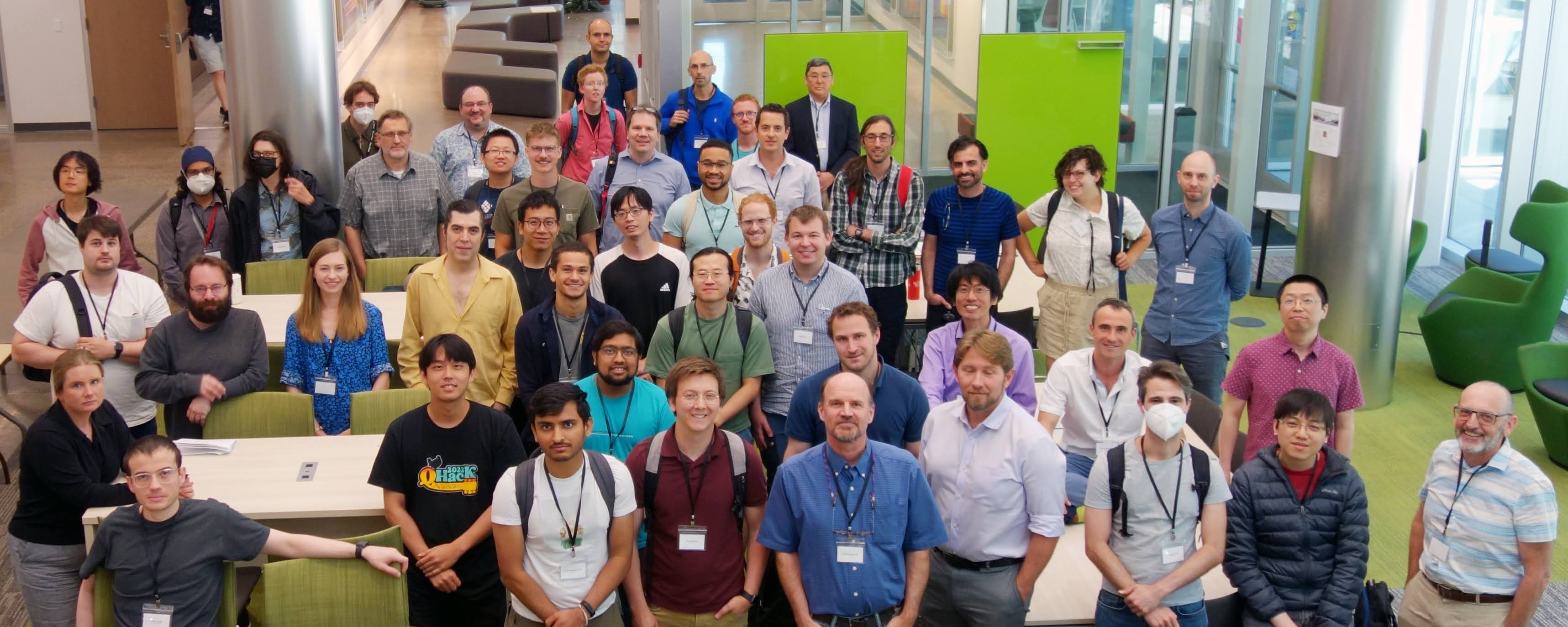National Leaders in Quantum Information Science launch inaugural Quantum Algorithms Workshop at UNM
June 9, 2022 - Irene Gray

From drug design to cyber security, researchers in Quantum Information Science (QIS) are leading the way in tackling some of the most complex issues of our time. Advancements within this field can only be made through strong collaborations between universities, National Labs, and industry. Thanks to a partnership between the Department of Energy's Quantum Science Center (QSC) and the Superconducting Quantum Materials and Systems (SQMS) Center, these already robust connections are being fostered in a whole new way.
From May 18 – 20, UNM’s Center for Quantum Information & Control (CQuIC) and Los Alamos National Labs (LANL) hosted the inaugural QCS/SQMS Quantum Algorithms Workshop. Nearly 100 national leaders within the field shared best practices to increase advancements in quantum computing. The hybrid event took place both in-person at UNM’s new state-of-the-art facility, Physics & Astronomy and Interdisciplinary Science (PAÍS), and virtually via Zoom.
The QSC and the SQMS are two of five targeted research centers developed by the Department of Energy under the National Quantum Initiative (NQI) to facilitate advancements in QIS in order to build the quantum workforce and drive scientific innovation.
The idea for the workshop arose when researchers from the QSC and SQMS realized there was a similarity between many of the algorithms being used in their computing. This commonality inspired the idea to come together and combine efforts to advance their research.

Woven in between two presentations per day were multiple discussion sessions, working breaks, and even a banquet. By allowing as much time as possible for attendees to build connections, the organizing committee hoped to inspire as many new research collaborations as possible.
 “This workshop came as COVID restrictions were winding down,” said Sornborger, director of the QSC at Los Alamos. “It really came down to the last minute before we decided to allow in-person attendance, but we felt that the hybrid aspect worked well due to PAIS’s state-of-the-art facilities and it was very valuable for those who couldn’t make it in person. For those who could, we enjoyed some camaraderie that we hadn’t felt for a long time.”
“This workshop came as COVID restrictions were winding down,” said Sornborger, director of the QSC at Los Alamos. “It really came down to the last minute before we decided to allow in-person attendance, but we felt that the hybrid aspect worked well due to PAIS’s state-of-the-art facilities and it was very valuable for those who couldn’t make it in person. For those who could, we enjoyed some camaraderie that we hadn’t felt for a long time.”
Topics for the three days were split between algorithms, applications, and hardware. Attendees were treated to presentations by leading experts within these fields, including Nathan Wiebe from Toronto; Matteo Ipolliti from Stanford University; Natalie Klco from Caltech; Peter Love from Tufts University; Naomi Nickerson from Psi Quantum; Josh Combes from the University of Colorado; and Robert Huang from Caltech.
The idea for the Quantum Algorithms Workshop coincidentally began forming around the same time that CQuIC was awarded a five-year, $3 million grant from the National Science Foundation’s Focused Research Hubs in Theoretical Physics (FRHTP) program to serve as a “theory hub” for QIS in New Mexico. As part of the FRHTP, CQuIC will be hosting focused workshops dedicated to advancing QIS, and the Quantum Algorithms Workshop was a perfect fit to lead this new effort.
Said Ivan Deutsch, Regents’ Professor and director of CQuIC, “Under the NSF’s FRHTP program, CQuIC is increasing its role as a focal point for the QIS community, hosting long-term visitors, hot-topics workshops, and our signature Southwest Quantum Information & Technology (SQuInT) conference. In addition, CQuIC serves as a hub for collaboration across the newly-established NQI Centers. The Quantum Algorithms Workshop between the QSC and SQMS demonstrated the great potential for CQuIC to facilitate this convergence and these workshops give UNM’s students exposure and access to some the nation’s greatest leaders at the forefront of the Second Quantum Revolution.”
This is only the beginning of an annual effort dedicated to driving new innovations in a rapidly evolving field, and New Mexico’s rich history in advancing QIS makes it the natural place to foster these initiatives.
